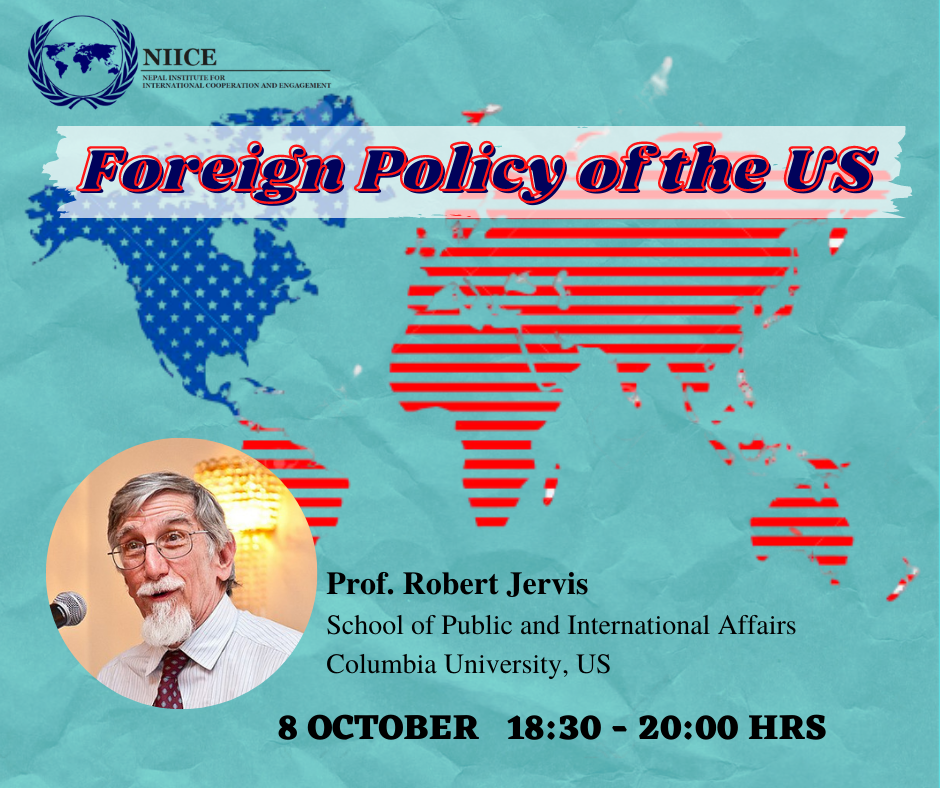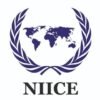
Foreign Policy of the US – Prof. Robert Jervis
Watch it on NIICE Nepal Youtube Channel
Event Report
NIICE organized a webinar on ‘Foreign Policy of the US’. The speaker for the event was Prof Robert Jervis, who is a Professor of International Politics, Columbia University and has been a member of the Columbia Political Science Department since 1980. He served as president of the American Political Science Association from the year 2000 till 2001. He explored various aspects of the topic which are elucidated below:
Background of Traditional American Foreign Policy
America is a young country little more than 200 years old with traditions in some ways were not as deeply rooted, yet are important. America's tradition and foreign policy is often termed as isolationist. Every American school child is familiar with Washington's Farewell Address, where he warned about entangling alliances. Unlike most democracies who keep their word, the US was born out of breaking treaties.
Unilateralism - Although the US was blessed by having large oceans on east and west, and relatively weak countries to the north, and south, it never was completely secure, even after the War of 1812. It always engaged with the world and traded extensively, both with Europe and with Asia.
It isn't so much isolation that characterises the American political tradition but unilateralism which enables the US acting on its own, not having binding alliances, and not paying nearly as much attention one way. By the 20th century, the fact of American economic power and naturally turning into military power
Foreign Policy is Rarely central - Domestic issues including ethnic politics, which are not new, with current concern about race and equity, go back to the founding are very strong economic considerations. So foreign policy is literally foreign to the United States.
The United States as Dinosaur - As George Kennan, an American diplomat and writer likened American democracy to a dinosaur, which pays very little attention to the external environment, until someone really whacks it on the tail or hits it on the head and gets it. The US tends to participate either not much, or maybe too much like in the war in Iraq.
Role of Leaders - Not only elected leaders, but the media that was more united industry, industrial leaders, union leaders, perceived threat from the Soviet Union, wars and alliances contributed producing the America, one that sees leadership, for better or for worse.
Foreign policy of the Trump administration
Lack of unifying force foreign policy - The administration is not split but fractured. Trump has never been able to exert discipline over the foreign policy. The official position of the US is that troop reductions depend on conditions such as progress towards lowering of violence and a ceasefire in Afghanistan or an agreement between the Taliban and the Afghan government and the negotiations going on in Doha. There are three American policies on Afghanistan, not one.
The key to American foreign Trump's foreign policy is that there is no key to it. When Trump is active in foreign policy, this policy reflects his personality. He's driven by a deep sense of personal grievance and a sense of grievance against the world. And because of this, the US has been ripped off, taken advantage of by adversaries and allies alike. In his book, John Bolton stresses on Trump's policy that is driven by nothing but the desire to get re-elected.
Policy and Personality – Trump’s policy has been quite consistent in the areas of trade and immigration in terms of anti-immigration and racism. The policy of separating parents from young children, attempt to make trade deals bilateral rather than multilateral, bringing jobs back to the US, stopping immigration, and his political campaigning is a reflection of what he believes.
He has a business background and has affinity with authoritarians. He likes strong men. He owns the ability to understand other leaders and to make connections with other leaders to manipulate other leaders.
Most people in the America are concerned with China's expansion into the South China Sea, new wolf warrior Chinese diplomacy, and Chinese aggressiveness on the border with India. On the contrary, Trump does not focus on these big strategic issues and threats.
Challenges for President Biden
Facing a Difficult World - To think one can go back to January 1, 2017 is tough to pick up where one left off. Its essential for Biden to have a reasonable policy as he will be immediately attacked domestically. One of the challenges being dealing with Iran, and handling an economy recovering from pandemic.
Trump knew that Americans still believe in American exceptionalism. Some critics, both domestic, leftist and abroad, think that America is unique, but uniquely evil, are uniquely aggressive. There are unusual things about the US but it’s essentially realist. American exceptionalism held by many people in the US who defend it, and many critics are both wrong. In any case, America and the world face real challenges.
Prepared by Aswathy B. Surendran, Intern at NIICE.

Recent Comments